Divinity: Original Sin
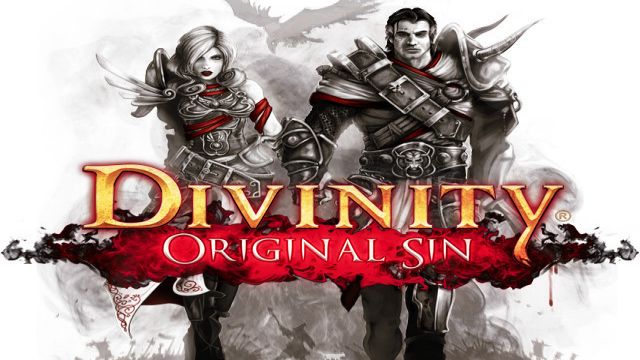
I’ve been reviewing games for a while now, playing them for the better part of two decades. Most games, I can judge in a manner of minutes, quite accurately, and a small few take a couple of hours for me to fully understand their breadth and depth. Divinity: Original Sin is probably the biggest “stumper” I’ve ever encountered. Even while writing this, I’m not entirely certain if I like it or not, and that should be one of the first check boxes a reviewer ticks. I can (and will) lead you through all of the games feature, point by point, and explain the pros and cons. But at the end, in answering the “Is it fun?” question, I’m frustratingly ambivalent.
As character creation is your first stop in the game’s progression, I’ll start there as well. Unlike most RPGs, where you create either a single hero or an entire party, Divinity requires you to make two “main characters” (half of a full party). The customization here is…lacking. You can only be humans but that’s not really a negative. What is a negative is that there are only 2 models available: short, slender female and tall, cartoonishly broad-chested male. For role-playing purposes this is quite limiting, since, while I can make a male thief character, it’s hard to imagine this Gaston-looking dude tip-toeing around. Likewise, a female warrior looks like she could barely raise a large sword, much less swing one. And this brings up the theme that will run throughout the entire review – there’s always something missing, always something coming up just short.
That theme continues on into the rest of character creation and leveling. You’re given enough facial and hair options to get by (still not very many, though), but the portraits aren’t dynamic, so you invariably end up with a portrait that doesn’t match your character, essentially always settling for “close enough”. The abilities, skills and spells all make sense and work well together, but there just aren’t enough of them. There’s even a neat Fallout-style perk system in place, but with so very few perks to choose from, you’ll be experience lots of overlap, even between only four party members.
Speaking of party members, as of this writing, there are exactly 2 companions in the game. That means if you want a full party of people with personalities, you’ll always be playing with the exact same party. This half-assing of a feature completely bowled me over. The internet is all aflutter with headlines such as, “Best RPG since the Baldur’s Gate series!” But if Baldur’s Gate had launched with only two potential party members to pick up, it would never have achieved the status it did. Yes, you can recruit personality-less “henchmen” that can fill in those two slots instead, but there isn’t even the facade of story supporting them; you merely enter your dream-like stronghold location and “buy” them, like you would a sword or helmet, soulless tools existing only to be used as fighting machines.
Divinity’s plot starts out as a cross between a “Go root out and kill those evil guys” and your standard “magical murder mystery”. As RPG stories go, it suffices and every once and while, can be mildly surprising. But the biggest problem is one of tone. Humor has always been a key part of the Divinity series but the degree has waffled quite a bit. In Original Sin, developer Larian Studios has decided to go full-on silly. Within the first few hours of play, you’re already running up against a depressed talking clam and soldiers that are childishly bemoaning that they’ve been turned into animate skeletons. Most of the time, I can’t tell if I’m playing an RPG or a parody of an RPG. I know easter eggs and funny tombstone epitaphs are a staple of many games in the genre, but when almost every single quest involves one jokey aspect or another, it seriously undercuts the dramatic pacing and desire to see what comes next, especially if the jokes are falling flat (sorry, but jokes written by RPG writers are never going to be comedy gold, no matter how much insider winking and pandering goes into it).
The UI is another rough spot, with inventory menus all stacking up on top of each other. During multiplayer, it can be next to impossible to read along while the other player is doing all of the talking, which makes playing co-op significantly less immersive. It’s also quite frustrating to continuously misclick (by a matter of a few pixels) next to an enemy, rather than on him, moving your character instead of attacking. It’s these rough edges that are most likely the hallmark of Kickstarted games but ones I’m hoping will be ironed out in future patches.
Loot is plentiful and randomized. While I’m fine with treasure chests giving different rewards per playthrough, I’m not a big fan of procedurally generated items (i.e. items created on-the-fly by the game, drawing from a list of magical effects). When all items are equally generated, nothing feels special, no item has any story to it. That, combined with the fact that much of the armor you get is painted bright pink and yellow, all serves to undercut the “cool” factor of decking your crew out in the latest finds. Likewise, all of the vendors are randomized. While some vendors certainly have a “theme” to their wares, the selection is all over the place. Five copies of the same spell and no copies of the one you actually want. Blacksmiths that have a strange assortment of swords and armor but nothing basic, that would allow you some modicum of regularity. In short, it feels like Larian just hit the “random button” and called it a day. While randomness can be good for replay value, the flip side of that coin is that nothing feels hand-crafted, nothing seems unique or interesting.
So that’s all the major downsides of Divinity; what are the positives? In a word, combat. Using a turn based tactical battle system allows each party member to feel truly unique and memorable in their contribution. And at the same time, the synergies between elements is second to none, which serves to take those individual strengths and amplify them into a cohesive whole. Where Dragon Age will give you your standard “light oil on fire” environmental effect, Divinity has seemingly infinite similar combinations. Start a battle by making it rain, giving everyone in the area a “wet” status. From there, cast a “chill” spell on an enemy to freeze his soaked body in place. And finally, when your archer’s turn comes up, shoot a lightning-infused arrow at the puddle that the rain created, stunning everyone whose feet happen to touch it. These combos can affect everyone equally, so pulling all of this off without hitting your warriors is all part of the game.
Another thing I love is that the game doesn’t hold your hand at all. There are almost no quest markers (the few you receive must be specifically written onto your map), and you’re allowed to explore anywhere you want, provided you’re comfortable with the possibility of dying suddenly. Like the Risen series, the only thing that determines whether you get through this forest or that cave is your ability (or lack thereof) to defeat the enemies in your way. Obviously the relative levels of all the combatants involved factor in heavily, but if you create an amazingly synergistic team of death-dealers, there’s no reason they can’t defeat monsters three levels higher than you. Of course, with level-scaling, randomized loot, one might argue, “Why bother?” To which I would sheepishly answer, “I’m…not sure.” Risen’s “go anywhere you are able” exploration works so well because the treasures are always the same, and not scaled to level. So if you brave the giant trolls wielding nothing but a rusty sword and miraculously win, you get items that are much more powerful than you should really have access to so early on. Here, you just get the same stuff you would have gotten if you’d explored in the easy areas first. Thus, Divinity’s exploration is a bit of a wash. Still though, I’m genuinely glad to be a slave to my journal to figure out the next step in my quests; it makes me feel like a true adventurer.
Divinity: Original Sin is a game that seems like it was made in self-contained modules and only thrown together at the last second before launch. They created an amazing combat system, they designed a respectably interesting and diverse world to explore, they packed said world full of quests, they created a hierarchical spell and item system, and they wrote a ton of dialogue. But like a jigsaw puzzle that’s created one piece at a time, when all of the pieces are finished, not all of the edges line up correctly. While playing, the phrase that kept running through my mind was “less than the sum of its parts.”
But here’s the good news: Larian has already made a bundle off of this release. That means more patches, more DLC, probably an expansion and definitely a sequel. While overall, I’m left with a slightly bad taste in my mouth, I’m quite excited to see where Larian takes this reinvigorated franchise. This is one of those games where, even though I’m not having as much fun as I wish I was, I’m very glad that it’s successful and I hope that success continues. It can only get better from here, right?
Reviewed By: Brian Mardiney
Publisher: Larian Studios
Rating: 80%
——————————————————————————–
This review is based on a digital copy of Divinity: Original Sin for the PC provided by Larian Studios.
 Game Over Online
Game Over Online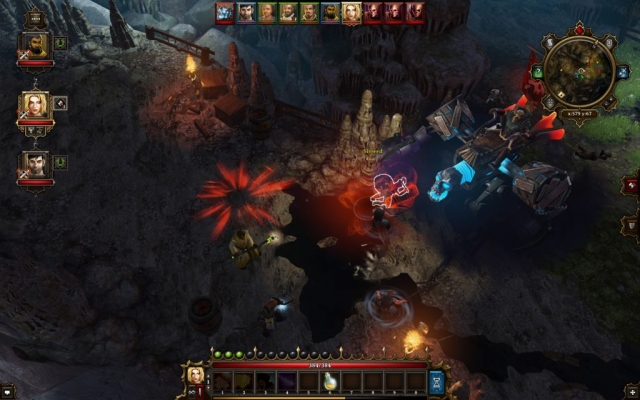
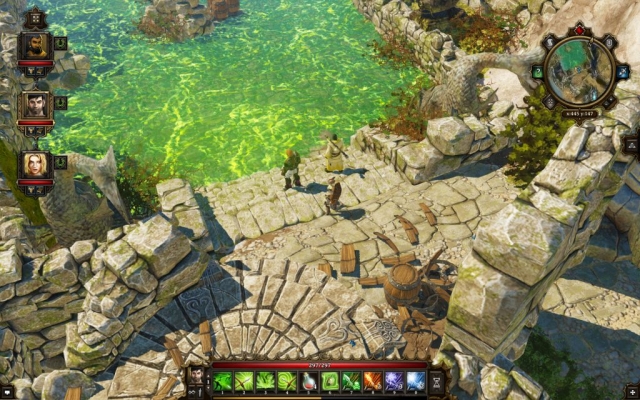
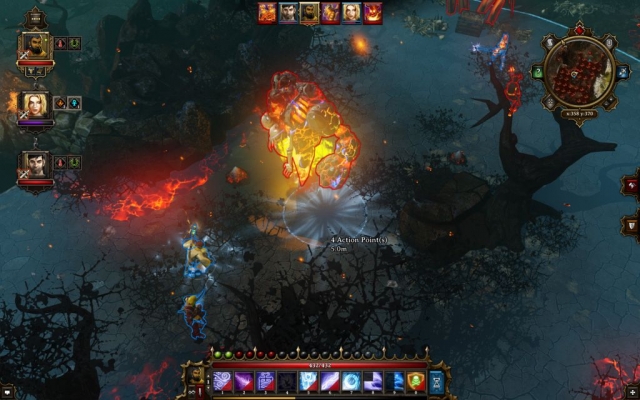
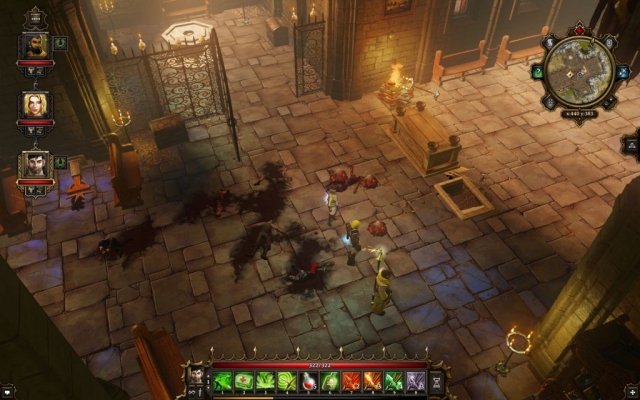










Finally, a review of this game that I agree with 100%